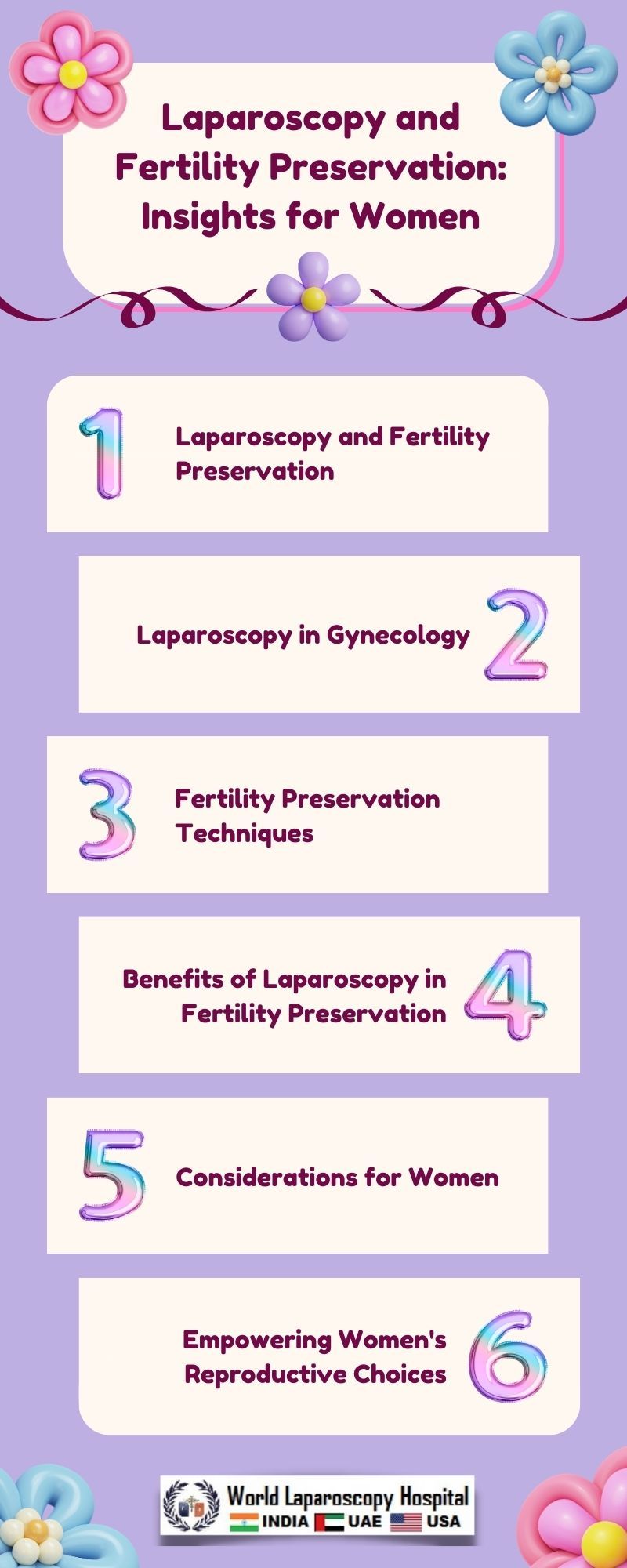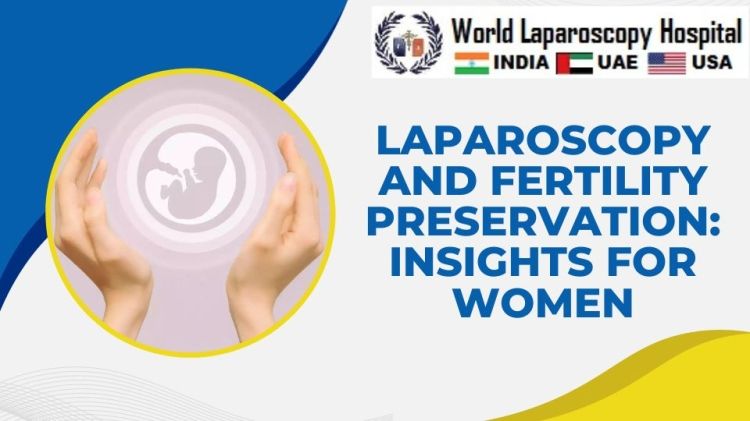Laparoscopy and Fertility Preservation: Insights for Women
Introduction:
In the realm of women's health, the intersection of medical advancements and fertility preservation has become a focal point, offering a myriad of possibilities for those navigating reproductive decisions. Laparoscopy, a minimally invasive surgical technique, emerges as a crucial player in this landscape, providing insightful avenues for both diagnosis and treatment while minimizing the impact on fertility. This article delves into the depths of laparoscopy, exploring its role in fertility preservation, the conditions it addresses, and the empowering choices it offers to women.

Understanding Laparoscopy:
Laparoscopy, often referred to as keyhole surgery or minimally invasive surgery, involves making small incisions through which a thin, flexible tube with a camera (laparoscope) is inserted into the abdominal or pelvic cavity. This technique allows surgeons to visualize and access the internal organs without the need for larger incisions, reducing scarring and expediting recovery.
The Role of Laparoscopy in Fertility Preservation:
Diagnostic Precision:
Laparoscopy serves as a diagnostic tool, allowing healthcare professionals to assess and diagnose various reproductive health issues with precision. Conditions such as endometriosis, pelvic inflammatory disease (PID), ovarian cysts, and uterine fibroids can be effectively identified through this procedure. Timely diagnosis is crucial for women contemplating fertility preservation.
Endometriosis Management:
Endometriosis, a common condition affecting the tissue lining the uterus, can significantly impact fertility. Laparoscopy not only aids in diagnosing endometriosis but also allows for its surgical management. By removing endometrial implants and scar tissue, laparoscopy can alleviate symptoms and enhance fertility prospects.
Ovarian Cyst Removal:
Ovarian cysts, fluid-filled sacs on the ovaries, can interfere with normal ovarian function and contribute to fertility issues. Laparoscopy enables the removal of these cysts, preserving the ovaries and promoting better reproductive health.
Fibroid Excision:
Uterine fibroids, noncancerous growths in the uterus, can impact fertility by obstructing the fallopian tubes or disrupting the implantation of embryos. Laparoscopy offers a minimally invasive approach to remove fibroids, addressing fertility concerns while minimizing the risks associated with traditional open surgery.
Tubal Ligation Reversal:
For women who have previously undergone tubal ligation but are now considering restoring fertility, laparoscopy provides an option for tubal ligation reversal. The procedure involves reconnecting the fallopian tubes, allowing the possibility of natural conception.
Empowering Women with Fertility Choices:
Laparoscopy not only serves as a diagnostic and therapeutic tool but also empowers women with choices regarding their reproductive health. By addressing underlying conditions that may compromise fertility, this minimally invasive approach offers a proactive stance on preserving fertility.
Fertility-Sparing Surgery:
In cases where surgery is necessary to address reproductive health issues, laparoscopy is often preferred for its fertility-sparing advantages. The precision of the procedure allows for targeted interventions while minimizing damage to healthy reproductive tissues.
Enhanced Recovery and Reduced Scarring:
Traditional open surgeries often involve larger incisions, leading to prolonged recovery times and more noticeable scarring. Laparoscopy, with its smaller incisions, promotes quicker recovery, allowing women to resume their daily activities sooner. The reduced scarring is not only cosmetic but also contributes to a lower risk of adhesions that could affect fertility.
Multidisciplinary Approach:
The use of laparoscopy in fertility preservation often involves a multidisciplinary approach, with gynecologists working collaboratively with reproductive endocrinologists, urologists, and other specialists. This team-based strategy ensures a comprehensive assessment and tailored interventions to optimize fertility outcomes.
Challenges and Considerations:
While laparoscopy offers significant advantages in fertility preservation, it is essential to acknowledge potential challenges and considerations associated with the procedure.
Skill and Experience:
Laparoscopic surgery requires a high level of skill and experience. Surgeons must undergo specialized training to master the intricacies of this technique. Women seeking laparoscopic procedures for fertility preservation should choose healthcare providers with expertise in reproductive surgery.
Cost Considerations:
While laparoscopy can be cost-effective compared to traditional open surgery in the long run due to reduced recovery times, the initial costs may be higher. Women should consider the financial aspects of the procedure and explore insurance coverage for fertility preservation interventions.
Individualized Treatment Plans:
Fertility preservation is not a one-size-fits-all approach. Each woman's reproductive health is unique, requiring individualized treatment plans. Laparoscopy provides a platform for tailored interventions, and healthcare professionals should prioritize personalized care to optimize outcomes.
Future Directions and Innovations:
As technology advances, the landscape of fertility preservation continues to evolve. Laparoscopy, already a cornerstone in this field, may witness further innovations and refinements. The integration of robotics, artificial intelligence, and other cutting-edge technologies may enhance the precision and scope of laparoscopic procedures, opening new possibilities for women seeking to preserve their fertility.
Conclusion:
Laparoscopy stands as a transformative tool in the realm of fertility preservation, offering women a proactive approach to safeguarding their reproductive health. From precise diagnostics to fertility-sparing surgeries, this minimally invasive technique aligns with the evolving landscape of women's healthcare. By understanding the role of laparoscopy and its empowering implications, women can make informed decisions about their reproductive futures, fostering a landscape where fertility preservation is both accessible and optimized for individual needs.


